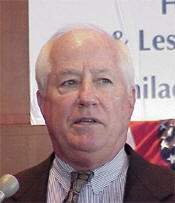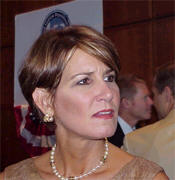 |


Aired Mostly by Protestors Focus on Lesbian Mary Cheney & Strategist Mary Matalin Vice-presidential Nominee's Daughter a Republican Problem |
|
By Rex Wockner
There are 19 openly gay delegates and alternates this year, up from six in 1996 and two in 1992. As this story went to press, Mary Cheney had not yet spoken to the media, but plenty of activists and media people were talking about her. "We understand they [Dick and Mary Cheney] love each other very much," said Human Rights Campaign (HRC) spokesman David Smith. "She often times goes on trips with him and they're very close. Both her parents have known that she's gay since the early 90s. She lives with her partner and I understand her and her partner go over to the home quite often, they get along as a family. The parents are comfortable with it and so is she. "The crux of it is, it's going to focus attention on Bush's anti- gay policy positions, and Cheney is going to look quite mean if he comes out and says: 'Yeah, I support a law that bans my daughter from adopting a child. I don't support a law that would protect my daughter from discrimination," Smith said. "This is all I've been working on for the last week an a half," he added.
Dick Cheney's record on gay issues includes supporting the military gay ban and voting against the Hate Crimes Statistics Act in 1988 as a congressman. George W. Bush is on record opposing job protections for gay people and gay adoption. He scuttled hate-crime legislation in Texas and has vowed to abolish the position of White House liaison to the gay community. Mary Matalin
"Huge numbers of gays support Republican policies and candidates but have felt unwelcome in the Republican party," Matalin said. "We shut them out. We turned out our hearts. That can happen no more -- that the loud voice of a few suffocates the big voice of the many. ... Our gathering here does mark, hopefully permanently, the end of the culture-wars rhetoric." In an interview with {name of this publication}, Matalin added: "Mary Cheney knows how to speak knowledgeably, reasonably, calmly and confidently on gay issues and [she] has. I hope she does. I don't know what her demands for privacy will be." Matalin said she's always been interested gay equality. "The epiphany for me is that people have some objection to homosexuality," she said. "They say it somehow hurts the traditional family. How? I'm advocating what I know to be the conservative philosophy. If you respect the individual, if you're about individual liberties and freedoms and all that stuff, you can't say, 'Except for that group or except for that person.' It's just so unjust and so unfair and so illogical. Illogic and unfairness offend me. I can't ever remember not talking about it." Matalin favors gay marriage "because it's logical." "You want to reduce promiscuity, you want to enhance stability -- duh, marriage, OK?" she said. The gay reception also was addressed by U.S. Sen. Jim Jeffords, R-Vermont, and openly gay U.S. Rep. Jim Kolbe, R-Arizona, who, on Aug. 1, addressed the convention itself during prime time, speaking about trade issues. "I'm from Vermont so I don't really need to say anything more than that," Jeffords said. "Vermont has said, under our common- benefits provision, that everyone is entitled to the protection of the law that have a lasting relationship and want to enjoy life together." Kolbe said: "We are members of the Republican party because we believe both in individual freedoms and in individual responsibilities -- in taking responsibility for our own actions and for our lives. There are many in our own party who seem to say that they want the government to stay out of our lives except when it comes to getting involved in our personal lives. Then you have the Democrat party which, by and large, says government shouldn't be involved in our personal lives but they should be involved in every other aspect of our lives -- whether it is the classroom or the workplace or in health care, the government should make all of those determinations." The Grand Dichotomy Despite several gay-friendly firsts at this year's convention, HRC's Smith said gays would be unwise to vote for Bush and Cheney. "The Republican Party is changing slowly but somewhat surely," he said. "But we're definitely concerned about George Bush's anti- gay policy positions that he's articulated as governor of Texas and during the primaries. We feel that he obviously would not be a good choice for president. We're going to actively work against him." HRC's Birch added: "The story for this convention is the grand dichotomy. Here you have a presidential candidate who finally has one meeting with a group of gay Republicans, and yet there's this restoration of mean-spirited, out-of-date, dinosaur [anti-gay] language in the platform. For an institution that is trying to argue that its edges are softening and that it is a larger, wider tent, it's looking more like a pup tent of exclusion, when you look only at the platform." The party platform opposes gays in the military, gay marriage, gay Boy Scouts and gay-rights laws. At the same time, after meeting with a group of 12 gay Republicans in April, Bush said: "The meeting was a wide-ranging discussion on issues. I'm a better person for the meeting. I enjoyed it. I welcome gay Americans into my campaign. "I want the Republicans, conservative Republicans, to understand we judge people based upon their heart and soul, that's what the campaign is about," he said. "And while we disagree on gay marriage, for example, we agree on a lot of other issues and it's important for people to hear that. ... These are individuals who've got interesting stories to tell and it's important for the next president to listen to people's real-life stories. These are people from our neighborhoods, people with whom all of us went to school, people who generally care about America, and I appreciate them sharing their stories with me. And I'm mindful that we're all God's children." |



